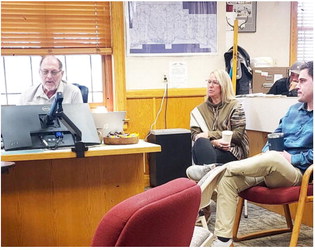Senate Passes Public Record Request Bill
Most state agencies presented with public records requests will have clear deadlines for compliance if Senate Bill 232 clears the Legislature and the governor’s desk.
The likelihood of both of those things happening is looking good: SB 232 sponsor Sen. Janet Ellis, D-Helena, worked with Gov. Greg Gianforte to develop a record request framework that both parties could live with, and an amended version of the bill unanimously passed the Senate March 2.
During a Feb. 22 hearing before the Senate State Administration Committee, Ellis read Article 2, Section 9 of the Montana Constitution, which holds that “no person shall be deprived of the right to examine documents or to observe the deliberations of all public bodies or agencies of state government and its subdivisions, except in cases in which the demand of individual privacy clearly exceeds the merits of public disclosure.”
Ellis said that constitutional right to know is great, but absent clear deadlines in state law, there’s no consistency in its application. Some public information requests are fulfilled within a month, she said, while others can languish for a year.
“That’s why Senate Bill 232 was born,” Ellis said. “To give actual deadlines.”
The original version of SB 232 would have required executive branch agencies to produce requested documents within 20 working days of the acknowledgment of their receipt. State employees would have an additional 20 working days to comply with more complicated requests, so long as the requester signed off on the extension.
But the original version of the bill also came with a sizable fiscal note. The state’s budget director estimated it would cost more than $4 million annually to comply with SB 232’s directives, mostly to obtain staffing and IT-related equipment to find and review records and manage the requests.
By working with the Gianforte administration to change those timelines, Ellis was able to bring the fiscal note down to $0, but that adjustment came with its own cost in timeliness. Per the amended version of the bill, an agency has five days from acknowledging receipt of a request to produce a single, clearly identifiable document, 90 days to comply with more complicated requests, and up to six months to fulfill yet larger and more involved requests.
Ellis also noted that the amended version of SB 232 gives the secretary of state, Justice Department, superintendent of public instruction and state auditor a bit longer to comply with the bill. Those agencies and offices won’t be required to meet SB 232’s directives until the fall of 2025.
Ellis described it as a test deadline bill that future Legislatures could expand to other areas of government, such as the Montana University System, the legislative branch and local governments.
SB 232 comes as Gianforte awaits a judicial decision on a prominent record request lawsuit.
In two lawsuits, one brought by an environment and public lands activist and the other brought by the Montana Environmental Information Center, the Gianforte administration has argued the governor’s “deliberative process” should be exempt from the state’s open records law. Plaintiffs counter that they believe the Montana Constitution’s right to know provision guarantees them access… SB 232 also comes as the governor is pitching lawmakers on his plan to facilitate more timely responses to record requests. His budget includes approximately $400,000 annually to create a new office, the Office of Public Information Requests, replete with three full-time staff.
“The OPIR would work in collaboration with state agencies to process information requests by centralizing what can be centralized, implementing enterprise software to help track and manage requests, standardize charges for requests, and creating reports or dashboards for requests,” according to the revised SB 232 fiscal note.
The governor’s budget also includes $2 million for an IT system to implement electronic discovery of information requests. The Montana Department of Environmental Quality, which served as an informational witness at the SB 232 hearing, said it’s been using a software system to manage the approximately 900 record requests it receives annually for the past three years.



